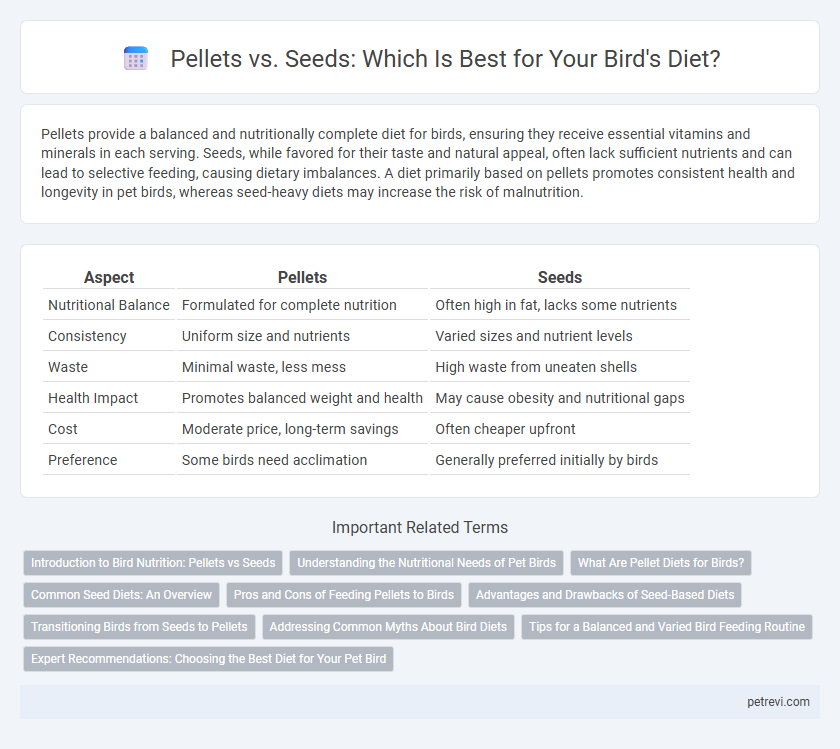Pellets provide a balanced and nutritionally complete diet for birds, ensuring they receive essential vitamins and minerals in each serving. Seeds, while favored for their taste and natural appeal, often lack sufficient nutrients and can lead to selective feeding, causing dietary imbalances. A diet primarily based on pellets promotes consistent health and longevity in pet birds, whereas seed-heavy diets may increase the risk of malnutrition.
Table of Comparison
| Aspect | Pellets | Seeds |
|---|---|---|
| Nutritional Balance | Formulated for complete nutrition | Often high in fat, lacks some nutrients |
| Consistency | Uniform size and nutrients | Varied sizes and nutrient levels |
| Waste | Minimal waste, less mess | High waste from uneaten shells |
| Health Impact | Promotes balanced weight and health | May cause obesity and nutritional gaps |
| Cost | Moderate price, long-term savings | Often cheaper upfront |
| Preference | Some birds need acclimation | Generally preferred initially by birds |
Introduction to Bird Nutrition: Pellets vs Seeds
Pellets offer balanced nutrition by combining essential vitamins, minerals, and proteins in a controlled form, reducing the risk of selective eating compared to seeds. Seeds often lack comprehensive nutrients and are high in fat, which can lead to obesity and nutrient deficiencies if not supplemented properly. Choosing pellets supports consistent dietary intake and promotes overall avian health, while seeds should be given as occasional treats or supplements within a varied diet.
Understanding the Nutritional Needs of Pet Birds
Pellets provide a balanced and complete nutritional profile specifically formulated to meet the essential dietary requirements of pet birds, ensuring consistent intake of vitamins, minerals, and proteins. Seeds, while favored for their taste, are often high in fat and lack sufficient vitamin A, calcium, and other crucial nutrients, leading to potential deficiencies if used as the sole diet. Understanding the nutritional needs of pet birds highlights pellets as a superior option to support overall health, longevity, and prevent diet-related illnesses.
What Are Pellet Diets for Birds?
Pellet diets for birds consist of nutritionally balanced, compressed food formulated to provide essential vitamins, minerals, proteins, and fats in a controlled portion. These pellets reduce selective feeding behaviors by preventing birds from picking only favored ingredients, promoting a complete diet that supports overall health, feather quality, and immune function. Compared to seeds, pellet diets minimize the risk of nutrient deficiencies and obesity often associated with seed-heavy feeding plans.
Common Seed Diets: An Overview
Common seed diets for birds typically include sunflower seeds, millet, safflower, and nyjer, each providing essential nutrients such as fats, proteins, and carbohydrates. While seeds are favored for their natural appeal and energy content, they often lack balanced vitamins and minerals needed for optimal bird health. Incorporating a variety of seeds or pairing them with pellets can help ensure a more comprehensive nutrient profile in a bird's diet.
Pros and Cons of Feeding Pellets to Birds
Pellets provide a nutritionally balanced diet, ensuring birds receive essential vitamins and minerals in consistent proportions, which helps prevent selective eating and nutrient deficiencies common with seed-only diets. However, some birds may initially reject pellets due to taste or texture preferences, potentially requiring gradual introduction and patience from the owner. Unlike seeds, pellets reduce the risk of obesity and malnutrition but may lack the enrichment benefits of foraging and cracking seeds, which are important for a bird's mental and physical stimulation.
Advantages and Drawbacks of Seed-Based Diets
Seed-based diets for birds offer variety and natural foraging behaviors, enriching mental stimulation and mimicking wild feeding patterns. However, seed diets can be nutritionally imbalanced, often high in fat and lacking essential vitamins and minerals, potentially leading to obesity and malnutrition. Monitoring seed intake and supplementing with pellets or fresh foods can help mitigate these drawbacks for healthier avian nutrition.
Transitioning Birds from Seeds to Pellets
Transitioning birds from seeds to pellets requires a gradual introduction to ensure dietary acceptance and nutritional balance. Start by mixing small amounts of pellets with their familiar seeds, gradually increasing the pellet ratio over several weeks to reduce stress and food rejection. Monitoring the bird's health and behavior during this transition is essential, as pellets provide more consistent nutrients compared to the variability of seed diets.
Addressing Common Myths About Bird Diets
Pellets offer a balanced nutrition profile specifically formulated to meet birds' dietary requirements, countering the myth that seeds alone provide all necessary nutrients. Seeds are high in fat and lack essential vitamins, often leading to deficiencies and selective feeding habits in birds. Scientific studies recommend a pellet-based diet supplemented with fresh fruits and vegetables to ensure optimal health and longevity in pet birds.
Tips for a Balanced and Varied Bird Feeding Routine
Pellets offer a nutritionally balanced diet by providing essential vitamins and minerals that seeds alone often lack, ensuring optimal bird health and feather quality. Incorporating a variety of seeds, fruits, and vegetables alongside pellets encourages natural foraging behavior and prevents dietary monotony. Regularly rotating food types and monitoring intake helps maintain a diverse and balanced bird feeding routine, promoting overall well-being and longevity.
Expert Recommendations: Choosing the Best Diet for Your Pet Bird
Experts emphasize that pellets provide a balanced and complete diet for pet birds, supplying essential vitamins, minerals, and nutrients often missing in seed-only diets. Seeds tend to be high in fat and low in nutritional diversity, which can lead to obesity and vitamin deficiencies in birds over time. Veterinary nutritionists recommend a diet primarily composed of pellets supplemented with fresh fruits, vegetables, and occasional seeds to promote optimal health and longevity in pet birds.
Pellets vs Seeds for Bird diet Infographic

 petrevi.com
petrevi.com